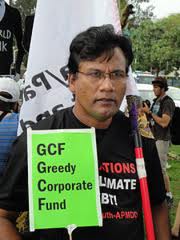
Green Climate Fund or Greedy Corporate Fund?
As the Green Climate Fund board gathers in Bali this week for its latest meeting, 80 civil society organizations sent a letter to GCF board members sounding the alarm about the attempted corporate takeover of the Green Climate Fund.
The letter cites several concrete and troubling examples of how multinational corporations have insinuated themselves into the governance and design of the GCF. A few include:
- Within the general UN Framework Convention on Climate Change process, there are nine non-governmental constituencies that are officially recognized as observers, from business and industry, to farmers, to Indigenous Peoples. But in the GCF, there are only two constituencies that are allowed to be observers: business and industry, and all other civil society organizations.
- The two business and industry observer seats have been captured by multinational corporations — while developing micro, small and medium size enterprises are underrepresented. To make matters worse, one of the observers is a vice president at Alstom Power Systems, a multinational corporation whose subsidiaries and affiliates have been sanctioned by the World Bank and other bodies for corrupt practices.
- From the beginning, several developed countries made it clear that their support for the new GCF was contingent on having a private sector facility as a major component of the Fund.
The letter urges that the GCF develop as an institution that truly prioritizes and meets the needs of climate-impacted people in developing countries, free of undue business and industry influence.
The message of the letter is particularly relevant in light of the extraordinary corporate capture at the Warsaw climate summit in November, which provides a powerful warning of what must not happen at the GCF.
Related Posts
Ways to Support Our Work

Read Latest News
Stay informed and inspired. Read our latest press releases to see how we’re making a difference for the planet.

See Our Impact
See the real wins your support made possible. Read about the campaign wins we’ve fought for and won together.

Donate Today
Help power change. It takes support from environmental champions like you to build a more healthy and just world.